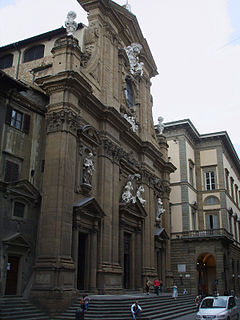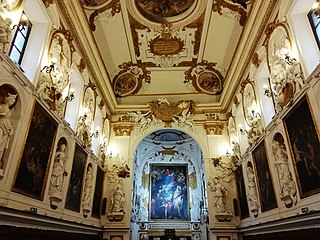
Michelangelo Merisida Caravaggio, known as simply Caravaggio, was an Italian painter active in Rome for most of his artistic life. During the final four years of his life he moved between Naples, Malta, and Sicily until his death. His paintings have been characterized by art critics as combining a realistic observation of the human state, both physical and emotional, with a dramatic use of lighting, which had a formative influence on Baroque painting.

Carlo Saraceni was an Italian early-Baroque painter, whose reputation as a "first-class painter of the second rank" was improved with the publication of a modern monograph in 1968.

San Leonardo in Arcetri is a Romanesque-style, Roman Catholic church located on Via di San Leonardo #25, a few hundred meters southeast of the Porta San Giorgio of Florence, Italy.

St John's Co-Cathedral is a Roman Catholic co-cathedral in Valletta, Malta, dedicated to Saint John the Baptist. It was built by the Order of St. John between 1572 and 1577, having been commissioned by Grand Master Jean de la Cassière as the Conventual Church of Saint John.

Nativity with St. Francis and St. Lawrence is a painting of the nativity of Jesus from 1609 by Italian painter Caravaggio. It has been missing since 1969 when it was stolen from the Oratory of Saint Lawrence in Palermo. Investigators believe the painting changed hands among the Sicilian Mafia in the decades following the robbery and may still be hidden. A replica was commissioned in 2015 and now hangs in the altar.
Bernardo Castello (1557–1629) was an Italian painter of the late-Mannerist style, active mainly in Genoa and Liguria. He is mainly known as a portrait and historical painter.

Saint Jerome Writing is a painting by the Italian master Michelangelo Merisi da Caravaggio in 1607 or 1608, housed in the Oratory of St John's Co-Cathedral, Valletta, Malta. It can be compared with Caravaggio's earlier version of the same subject in the Borghese Gallery in Rome.
Events from the year 1609 in art.

Tommaso Donini or Tommaso Dovini, called Il Caravaggino was an Italian painter active mainly in Rome. He was previously erroneously referred to as 'Tommaso Luini' as the 17th century artist biographer Giovanni Baglione referred to him as such in his Le Vite de’ Pittori of 1642. Donini painted altarpieces. He was a follower of Caravaggio.

San Gaetano, also known as Santi Michele e Gaetano, is a Baroque church in Florence, Italy, located on the Piazza Antinori.

Bastiano di Bartolo Mainardi was an Italian painter of the Early Renaissance. He was born in San Gimignano and was active there and in Florence.

Lorenzo Salimbeni and Jacopo Salimbeni, brothers had careers that spanned in both relatively narrow area and short time, from the triptych painting of the altarpiece of the Mystical Marriage by Lorenzo alone in 1400 to the frescoes of the Crucifixion and Scenes from the Life of St John the Baptist in the Oratory of St John the Baptist, Urbino, in 1416. However, the major part of their work is to be found in churches in and around their home town, San Severino Marche.

Antonio Brilla was a prolific Italian sculptor and ceramic artist mainly active in Liguria. He travelled in 1838 to Florence to study masterworks, where he met Giovanni Duprè and Lorenzo Bartolini. He returned to Savona to establish a studio. Two of Antonio's sons also were artists.

San Francesco is a Romanesque and Gothic-style, Roman Catholic church located at Piazza San Francesco in Pescia, region of Tuscany, Italy.

San Michele e San Francesco is a renaissance-style, Roman Catholic parish church located in the Piazza SS Francesco e Michele in the town of Carmignano, province of Prato, region of Tuscany, Italy. It is best known for housing the Jacopo Pontormo altarpiece of the Visitation.

The Church of Saint Ignatius is a Baroque church of Palermo. It is located in the ancient neighborhood of the Olivella, in the quarter of the Loggia, within the historic centre of Palermo.

The Oratory of the Rosary of Saint Dominic is a Baroque oratory of Palermo. It is located near the Church of Saint Dominic, in the quarter of the Loggia, within the historic centre of Palermo.
Giovanni Ravalli was an Italian officer who was imprisoned for war crimes he committed during the Axis occupation of Greece during World War II. Following his pardon he served as police prefect of Palermo, investigating the theft of Caravaggio's Nativity with St. Francis and St. Lawrence.
The Oratorio del Rosario di Santa Cita is a Baroque chapel or prayer room located in the quarter of the Castellamare within the historic center of Palermo, region of Sicily, Italy. The site is best known for the remarkable stucco tableux scenes composed during 1687-1718 by Giacomo Serpotta.

The Oratory of Saint Catherine of Alexandria is a Baroque oratory located attached to the church of Sant'Ignazio all'Olivella, in the quarter of the Castellammare of Palermo, region of Sicily, Italy.

















